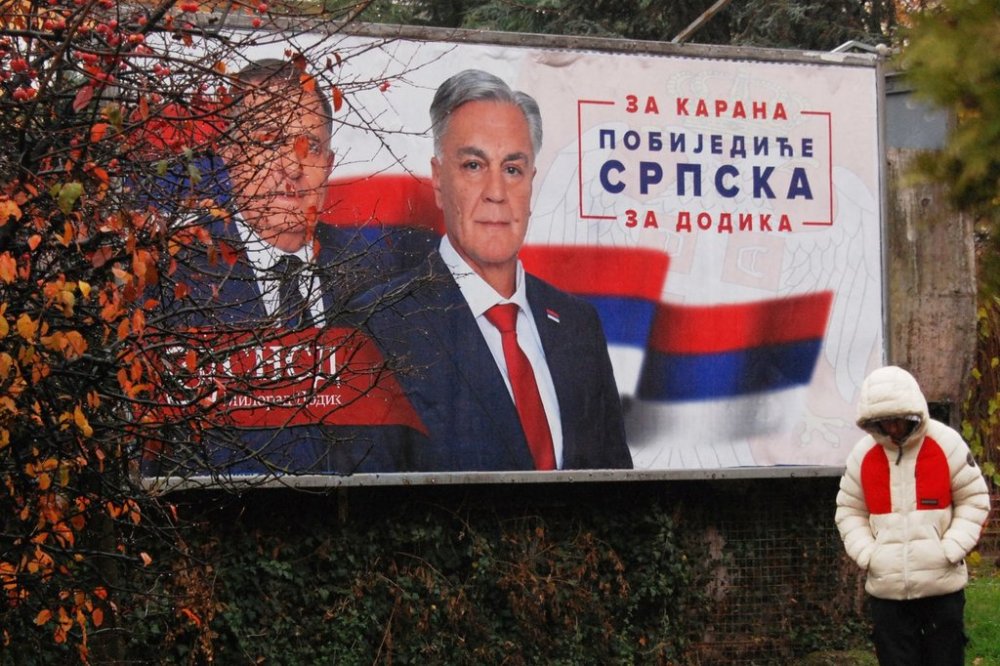Bosnian Serbs vote to choose president after separatist leader Dodik was removed from office
Advertisement
Read this article for free:
or
Already have an account? Log in here »
To continue reading, please subscribe:
Monthly Digital Subscription
$0 for the first 4 weeks*
- Enjoy unlimited reading on winnipegfreepress.com
- Read the E-Edition, our digital replica newspaper
- Access News Break, our award-winning app
- Play interactive puzzles
*No charge for 4 weeks then price increases to the regular rate of $19.00 plus GST every four weeks. Offer available to new and qualified returning subscribers only. Cancel any time.
Monthly Digital Subscription
$4.75/week*
- Enjoy unlimited reading on winnipegfreepress.com
- Read the E-Edition, our digital replica newspaper
- Access News Break, our award-winning app
- Play interactive puzzles
*Billed as $19 plus GST every four weeks. Cancel any time.
To continue reading, please subscribe:
Add Free Press access to your Brandon Sun subscription for only an additional
$1 for the first 4 weeks*
*Your next subscription payment will increase by $1.00 and you will be charged $16.99 plus GST for four weeks. After four weeks, your payment will increase to $23.99 plus GST every four weeks.
Read unlimited articles for free today:
or
Already have an account? Log in here »
SARAJEVO, Bosnia-Herzegovina (AP) — Voters in the Serb-run part of Bosnia cast ballots on Sunday to elect a new president after former pro-Russian leader Milorad Dodik was removed from office over separatist policies that were stoking instability in the ethnically tense Balkan nation.
Dodik was ousted in August when a Bosnian court convicted him of disobeying the orders of the international High Representative for Bosnia, sentenced him to a year in prison and banned him from holding any public office. He has since paid a fine to stay away from jail and stepped aside as president while staying at the helm of his governing Party of Independent Social Democrats.
Sunday’s snap ballot pits Sinisa Karan, who is backed by Dodik, against Branko Blanusa, a university professor who is a candidate of the opposition Serb Democratic Party. Four more contenders are in the race but they are not considered strong candidates.

Blanusa said upon casting his ballot in the northwestern town of Banja Luka that “the election campaign passed in a fair and tolerant atmosphere.”
“I hope the election day will be the same,” Blanusa added, urging a high turnout among the 1.2 million Bosnian Serb voters.
Bosnian Serbs are in charge of about one-half of Bosnia, which is called Republika Srpska. The other half is run jointly by Bosniaks, who are mainly Muslims, and Croats. The two entities are bound together by a central administration.
Bosnia’s complex political structure was established 30 years ago in a U.S.-brokered peace agreement to end a bloody 1992-95 ethnic conflict that killed more than 100,000 people and left millions homeless.
The war started when Bosnia declared independence from Yugoslavia and the country’s Serbs took up arms to carve up their own territory, hoping to join with neighboring Serbia. Dodik still advocates eventual separation of the Serb-controlled entity from Bosnia, which he has repeatedly declared unviable.
Dodik had faced U.S. and British sanctions for such policies. But the United States lifted the sanctions last month after Dodik agreed to step down. He also has repeatedly clashed with the international envoy overseeing the peace, Christian Schmidt, and declared his decisions illegal in Republika Srpska.
Dodik has actively taken part in Karan’s election campaign. He told voters that “I will remain with you to fight for our political goals” and Karan’s “victory will be my victory too.”

